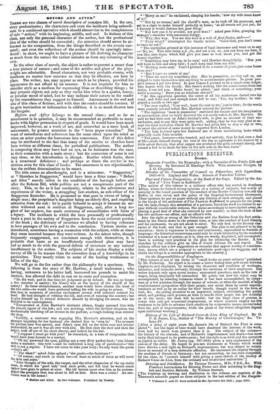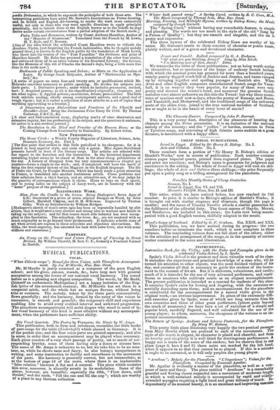PUBLICATIONS RECEIVED.
Boom.
Benjamin Franklin; his Biography.; with a Narrative of his Public Life and Services. By Reverend H. Hastings Weld. With numerous Designs, by J. G. Chapman. Minutes of the Committee of Council on Education; with Appendices. 1847-8-9. England and Wales. Schools of Parochial Unions.
Past and Future Emigration; or the Book of the Cape. Edited by the Au- thor of "Five Years in Kafirland."
[The author of this volume is a military officer who has served in Southern Africa, where he formed strong opinions on a variety of subjects, but nearly all merging in the vexed question of the conduct of the Border Colonists towards the Kafirs, or vice versa, and the policy of the Imperial Government thereanent. These opinions he put on paper without any dilution of their strength, and placed in the hands of the authoress of Five Years in Kaiholand, to prepare for the press: but the lady, though also somewhat of a partisan, found the work too violent to ap- pear without considerable revision. She seems accordingly to have slashed away, re- placing a good deal of what she removed by new matter; so that the book in fact has two authors—an officer, and an officer's wife. Into the right or wrong of the Colonists and the Natives from the first settle- ment by the Dutch down to the present time, or into the conduct of Lord Glenelg and his successors we are not about to enter. We only look to the literary cha- racter of the book, and that is poor enough. The plan is not adhered to in the execution: there is vagueness in facts and conclusions, superadded to warmth of language: the historical occurrences could only be made interesting by the masterly treatment of a man of genius- as it is, they are wordy, disjointed, and incomplete: there is nothing very practical in the plan for colonizing the Border. A few sketches by the editress give an idea of South African life and travel. The military officer has a few suggestions or remarks that appear worthy of considera- tion; among which are a proposal to substitute pack-oxen for waggons, and to clothe the troops in a costume appropriate to the country.] On the Responsibilities of Employers. [This volume is one of the series of • small books on great subjects" published by Mr. Pickering. Its object is to create a better feeling than now exists between employers and employed, by raising the character and condition of workmen, labourers, and domestic servants, through the exertions of their employers. The writer depends only upon moral means; economical questions, such as the rate of wages, being designedly left untouched. He points out how his object may be accomplished, by selecting instances where it has been accomplished, by clergy- men of a few parishes through the means of schools, or when the masters of large establishments sympathize with their people, and assist them by social superin- tendence as well as by an outlay for their benefit, though repaid in the form of rent, &c. As calling attention to an important subject, stimulating the public mind, and guiding such persons as wish to benefit their people but are doubtful as to the mode, the book will be useful: but the large class of persons in towns who only get occasional employment, or whose masters employ too few workmen to be able to advance their condition by cooperative means, are excluded from the pale of improvements; while the plans of the writer altogether depend upon individual working.] History of the Lye of Richard Cwur-de-Lion King of England. By 111. P. R. James, Lsq., Author of "The History of Charlemagne," &c. Vo- lume IV.
[After a delay of eight years Mr. James's life of Richard the First is coin. pleted *: but the lapse of time would have deadened the interest of the work, even had its merit been greater than it is. The subject of the volume-. the history of the crusade, and of Richard's imprisonment and death—has mote unity than belonged to its predecessors ; but the style is as level and the narrative as jogtrot as before. Mr. James (pp. 287-288) gives a note explanatory of the causes of the delay. He hoped to procure documents at Vienna which would have thrown a new light on Richard's imprisonment, but was obliged to return home on account of a deep domestic affliction. He continued the inquiry through the medium of friends in Germany; but not succeeding, he has been compelled, for the close, to "content himself with giving a mere sketch of the history of Richard Cosur-de-Lion, from the ordinary and established authorities."] Brewing and Distillation. By Thomas Thomson, M.D., F.R.S., &e. With Practical Instructions for Brewing Porter and Ales according to the Bag- halo and Scottish Methods. By William Stewart. [The treatises on brewing and distillation in this volume are reprints of Dr. Thomson's scientific papers on those subjects in the last edition of the Encyclo- * Volumes I. and II. were notizedla the Spectator for 1841; page 1051. podia Britannica, in which he expounds the principles of both those arts. The enterprising publishers have added Mr. Stewart's Instructions on Porter-brewing, and OD Scotch and English Ale-brewing, to render the work more extensively useful, not only to those who may want specific directions to apply principles practically, but to furnish hints to the English brewer as to the benefit he may derive under certain circumstances from a partial adoption of the Scotch mode.]
Fairy Tales and Romances, written by Count Anthony Hamilton, Author of the "Memoirs of Grammont." Translated from the French by M. Lewis, H. T. Ryde, and C. Kenney. [One of the tales which the celebrated Count Hamilton wrote to ridicule the Arabian Nights, (not forgetting the French fashionables, who he thought unduly praised them,) is known to the English public by the translation of Monk Lewis,. who threw into his version of the Four Facardins " the liveliness and point of Hamilton himself. Mr. Bohn has procured a translation of the other four stories, and embraced them all in an extra volume of his Standard Library; the fictions, like the Memoirs of this wit of Charles the Second's days, being a little more free than is the mode now.] Rudiments of Public Speaking and Debate; or Hints on the Application of Logic. By George Jacob llolyoake, Author of "Mathematics no Mys- tery," &c. [A series of papers on some four-and twenty arts or qualifications which Mr. Holyoake considers necessary to public speaking. He divides his subjects into three parts. 1. Derivative powers; under which he includes persuasion, method, tact: 2. Acquired powers; as (it is his classification) originality, eloquence, and ten other topics: 3. Applied powers; as criticism, debate, personalities. The little book exhibits reading, chiefly among contemporary authors, and a good deal of rough vigour; but it is rather a collection of short articles on a set of topics than anything approaching to a treatise.] A Dissertation upon Dislocations and Fractures of the Clavicle and Shoulder-Joint. Being the Jacksonian Prize Essay for 1846. By Thomas Callaway, F.R.C.S., &c. [A clear and well-considered essay, displaying marks of close observation and extensive inquiry, but too professional in its subject, and the questions it embraces, for notice in a non-medical journal.] The Revolution in the Mind and Practice of the Human Race; or the Coming Change from Irrationality to Rationality. By Robert Owen.
NEW PERIODICAL.
The Home Circle: a Weekly Family Magazine of Literature, Science, Arts, Domestic Economy, &e. Part I.
[The first point that strikes in this little periodical is its cheapness; for it is printed in very superior style, and costs only a penny. Miss Agnes Strickland presents herself in front of the literary corps. The articles are selected with due regard to the harmless and the instructive. In the historical department something higher seems to be aimed at than in the other cheap publications of the day. A history of Hungary from the very commencement—a chapter per number—forms a staple to the work; and, if completed, will have the merit of being the first regular history of the Magyars in the English language. The life of Pedro the Cruel, by Prosper Meniuee, which has lately made a great sensation in France, is translated into another continuous article. Chess problems and their solutions form a third feature, and an attractive one, if we may judge by the quantity of correspondence which it elicits. Hints to boys on their sports, and to young ladies on the subject of fancy-work, are in harmony with the "borne purpose of the periodical.] ILLUSTRATED WORK.
Man, from the Cradle to' the Grave. Being Shakspere's Seven Ages of Life; illustrated in aeries of seven original Designs on Wood, by John Gilbert, Marshall (ileatcre,,'-and 1). Ii. likKewan. Engraved' by Thomas Gilks. With an Intraiiction by William Bridges.
[Shakspere's sketch of man's seven ages has been so repeatedly handled by able artists, that it would peed a very distinct and strong idea to warrant new binds in taking up the subject; and for that reason much able industry has been misap- plied in this fasciculus. The schoolboy, the lover, &c., are not rendered with so much originality as to go beyond their predecessors. It indicates a feeble state of art when artists are copious in these actionless and objectless abstractions. Mr. Gilks, the wood-engraver, has executed his task with some force, also with some stiffness and coarseness.] PAMPHLET.
An Essay on the Present and Future Prospects of Farming in Great Britain. By William Thorold, M. Inst. C. E., formerly a Practical Farmer in Norfolk.



























 Previous page
Previous page